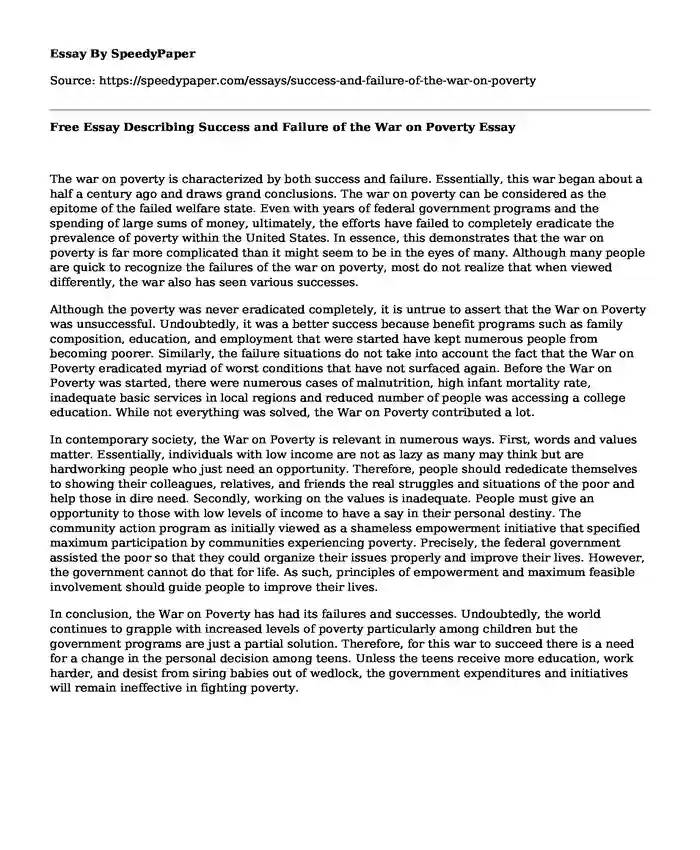The war on poverty is characterized by both success and failure. Essentially, this war began about a half a century ago and draws grand conclusions. The war on poverty can be considered as the epitome of the failed welfare state. Even with years of federal government programs and the spending of large sums of money, ultimately, the efforts have failed to completely eradicate the prevalence of poverty within the United States. In essence, this demonstrates that the war on poverty is far more complicated than it might seem to be in the eyes of many. Although many people are quick to recognize the failures of the war on poverty, most do not realize that when viewed differently, the war also has seen various successes.
Although the poverty was never eradicated completely, it is untrue to assert that the War on Poverty was unsuccessful. Undoubtedly, it was a better success because benefit programs such as family composition, education, and employment that were started have kept numerous people from becoming poorer. Similarly, the failure situations do not take into account the fact that the War on Poverty eradicated myriad of worst conditions that have not surfaced again. Before the War on Poverty was started, there were numerous cases of malnutrition, high infant mortality rate, inadequate basic services in local regions and reduced number of people was accessing a college education. While not everything was solved, the War on Poverty contributed a lot.
In contemporary society, the War on Poverty is relevant in numerous ways. First, words and values matter. Essentially, individuals with low income are not as lazy as many may think but are hardworking people who just need an opportunity. Therefore, people should rededicate themselves to showing their colleagues, relatives, and friends the real struggles and situations of the poor and help those in dire need. Secondly, working on the values is inadequate. People must give an opportunity to those with low levels of income to have a say in their personal destiny. The community action program as initially viewed as a shameless empowerment initiative that specified maximum participation by communities experiencing poverty. Precisely, the federal government assisted the poor so that they could organize their issues properly and improve their lives. However, the government cannot do that for life. As such, principles of empowerment and maximum feasible involvement should guide people to improve their lives.
In conclusion, the War on Poverty has had its failures and successes. Undoubtedly, the world continues to grapple with increased levels of poverty particularly among children but the government programs are just a partial solution. Therefore, for this war to succeed there is a need for a change in the personal decision among teens. Unless the teens receive more education, work harder, and desist from siring babies out of wedlock, the government expenditures and initiatives will remain ineffective in fighting poverty.
Cite this page
Free Essay Describing Success and Failure of the War on Poverty. (2022, Sep 23). Retrieved from https://speedypaper.com/essays/success-and-failure-of-the-war-on-poverty
Request Removal
If you are the original author of this essay and no longer wish to have it published on the SpeedyPaper website, please click below to request its removal:
- Inadequate Information on Hydration, Public Health Essay Sample
- Man Flu Essay Sample
- The Nature of Perception, Marketing Essay Example
- Free Paper with Essays Analysis
- Essay Example: Safety of the Classroom Environment
- Why Nursing career became a choice
- Free Essay: Application for a Graduate Research Executive Position.
Popular categories





